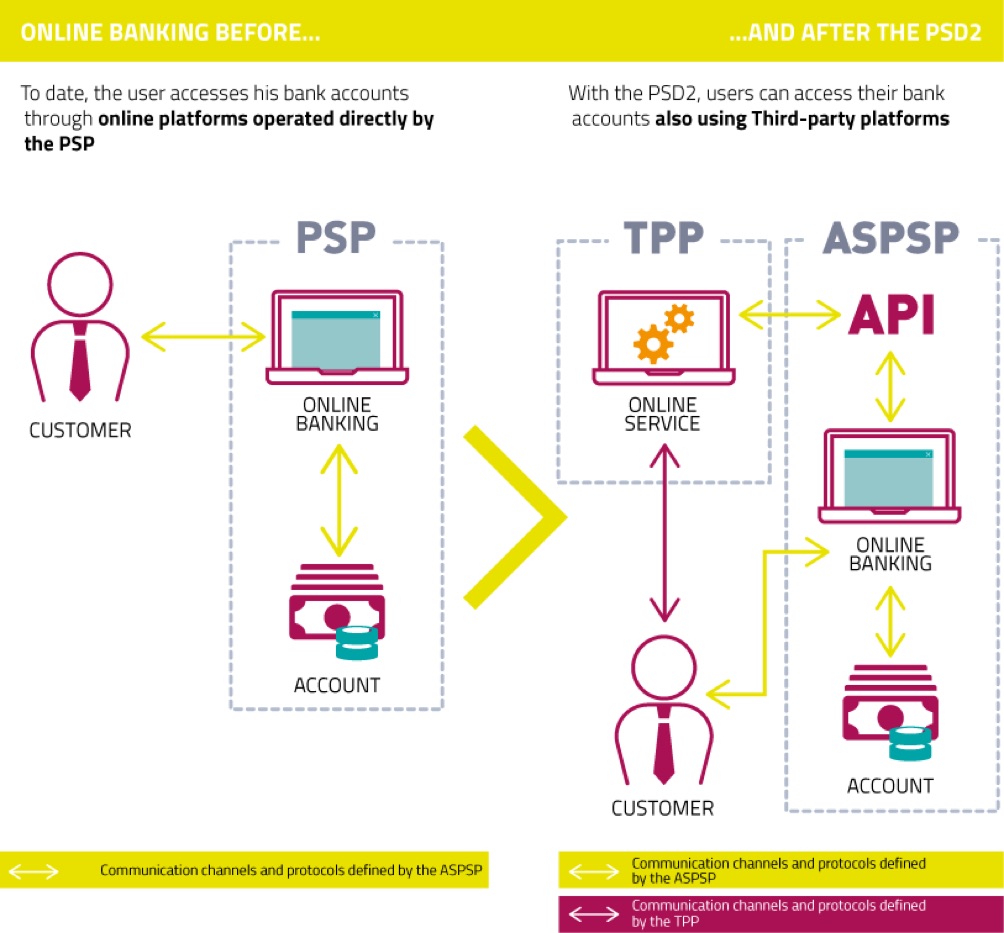1. Introduction: Difference between revisions
No edit summary |
No edit summary |
||
| (16 intermediate revisions by the same user not shown) | |||
| Line 1: | Line 1: | ||
<div class="nextsection"> | |||
[[2. Actors and definitions|2. Actors and definitions >>]] | |||
</div> | |||
<div class="nofloat"> </div> | |||
---- | |||
'''PSD2: the history''' | '''PSD2: the history''' | ||
'''The evolution of the market of payment services''' is accelerating at high speed, driven by | '''The evolution of the market of payment services''' is accelerating at high speed, driven by | ||
| Line 6: | Line 13: | ||
reshaping the rules of the market. | reshaping the rules of the market. | ||
'''The first | '''The first Payment Services Directive (PSD) was adopted''' in 2007 in order to increase | ||
competition in the pan-European market by extending its validity even to non-bank parties | competition in the pan-European market by extending its validity even to non-bank parties and, at the same time, to harmonise the rules to ensure the safety of consumers. The directive provided for the introduction of a regulatory framework for the SEPA (Single Euro Payments Area) concerning payments within the European area. | ||
and, at the same time, to harmonise the rules to ensure the safety of consumers. | |||
The directive provided for the introduction of a regulatory framework for the SEPA (Single Euro | |||
Payments Area) concerning payments within the European area. | |||
Over the past decade, since the entry into force of the PSD, the evolution in digital | Over the past decade, since the entry into force of the PSD, the evolution in '''digital technologies''' and the entry of '''new operators from the Fintech world''' in the financial sector have identified the urgency for a review and definition of the PSD in the light of the new scenarios considered as “out of scope” in the initial legislation. | ||
technologies and the entry of new operators from the Fintech world in the financial | |||
sector have identified the urgency for a review and definition of the PSD in the light of the new | |||
scenarios considered as “out of scope” in the initial legislation. | |||
The aim of the Directive 2015/2366/EU, known as '''PSD2''', is in fact expanding the scope of the | The aim of the Directive 2015/2366/EU, known as '''PSD2''', is in fact expanding the scope of the | ||
| Line 30: | Line 31: | ||
compared to the previous PSD. | compared to the previous PSD. | ||
<div class="centra-immagini"> | |||
[[File:intro.jpg|100%|Overall Payment's Flow 1/5]] | |||
'''PSD2 WILL PROVIDE USERS WITH NEW POSSIBILITIES OF ACCESS TO THEIR BANK ACCOUNTS''' | |||
[[File:intro2.jpg|100%|Overall Payment's Flow 1/5]] | |||
</div> | |||
---- | |||
<div class=" | <div class="nextpage"> | ||
[[ | [[1.1 API and PSD2|1.1 API and PSD2 >>]] | ||
</div> | </div> | ||
Latest revision as of 19:07, 14 March 2019
PSD2: the history
The evolution of the market of payment services is accelerating at high speed, driven by
continuous technological innovation and by the significant current legislative changes, that are
reshaping the rules of the market.
The first Payment Services Directive (PSD) was adopted in 2007 in order to increase competition in the pan-European market by extending its validity even to non-bank parties and, at the same time, to harmonise the rules to ensure the safety of consumers. The directive provided for the introduction of a regulatory framework for the SEPA (Single Euro Payments Area) concerning payments within the European area.
Over the past decade, since the entry into force of the PSD, the evolution in digital technologies and the entry of new operators from the Fintech world in the financial sector have identified the urgency for a review and definition of the PSD in the light of the new scenarios considered as “out of scope” in the initial legislation.
The aim of the Directive 2015/2366/EU, known as PSD2, is in fact expanding the scope of the
PSD:
- improving payment security and consumer protection
- encouraging innovation and competition
- ensuring the same level playing field to all the players in the market, including new ones and those who will come forth in the future in the payments market
The Directive 2015/2366/EU , called PSD2, represents another step forward to the complete harmonisation of the EU payments market and introduces important changes compared to the previous PSD.

